"I'm leaving. My last day is next Friday.”
I still remember the surprise when one of my old coworkers announced that to the company.
He was one of the longest-tenured members of the team and seemed content on the job. Little did I know he had a number of motivations for wanting to make a change that may have been avoidable.
The competition for talent is always high, and especially now you can't afford to lose a good employee. Even the most loyal members of your team have breaking points that will make them want to look for a new job.
Not only then are you losing a great employee, but you're paying for it. According to a study by the Society for Human Resource Management (SHRM), when an employee leaves it costs an average of 6-9 months of your former employee's salary to find and onboard their replacement.
But that's just one employee. Worst of all is that it can cause everyone to quit at work, meaning that you lose more than just one good person at a time.
People leave bad managers, not companies, which means as a manager, you have the power to prevent many of these losses to your team. Avoiding these pitfalls will put you well on your way to retaining your team.
Today, we help you understand why good employees leave, and what to do to prevent it.

14 Reasons Why Great Employees Quit (+ How to Keep a Good Employee from Quitting)
There are a lot of reasons why great employees quit and leave your company.
Some are easier to deal with than others, but no matter what's going on there's always something you can do.
That's why below, we won't just be going over reasons why good employees leave, but also showing you how to keep a good employee from quitting to avoid each problem in the first place.
We'll be covering...
Table of Contents
- 14 Reasons Why Great Employees Quit
- Lack of follow through
- You don't have 1 on 1s with them
- Their ideas are ignored
- Not being treated like an adult
- Under compensating them
- Failing to praise, recognize, or reward good work
- Keeping bad employees
- Keeping high performing assholes
- Not aligning their work with their goals
- Embarrassing them in front of their peers
- A lack of regular progress
- Being a hypocrite, aka - "Do as I say not as I do”
- Not getting their buy-in and support as things change
- Overloading them or burning them out
- Additional resources
Here are the 14 reasons why good employees leave...
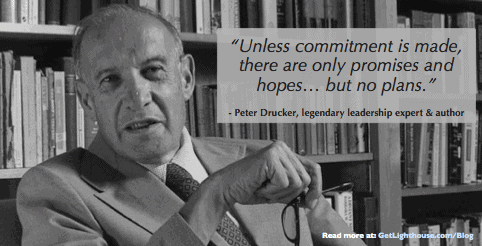
1) Lack of follow through
We've written about this a number of times before and it bears repeating: not following through with commitments to your team will quickly build resentment.
That resentment will lead to complaining among team members behind your back and a lot of frustration and distrust that can hamstring your team's productivity.
And over time, that can snowball into something much worse: a wave of turnover.
As soon as your team believes you don't care, trust begins to erode. Eventually, that leads to them giving up on you altogether. When that happens, you can lose a lot more than just productivity. You end up sitting there wondering, "why did my best employee quit?"
What to do instead:
Use a to-do list or another system to track your commitments to your team to make sure nothing slips.
Meanwhile, if there's something that prevents you from following through that's beyond your control, be transparent with your team and help them understand why you couldn't do it.
Sometimes things happen that you didn't see coming, or that can get in the way of your commitment to your team.
The last thing you should do is try and sweep it under the rug and act like it didn't happen. Instead, face it as directly and transparently as you can, whether it's because you're dealing with some kind of company crisis, personal issues, or worse, the death of a loved one.
It might be hard to reach out to your team that first time and explain what's going on, but once you've done it, they'll understand and have your back for it, just as you would for them.
Further reading:
- Learn why multiple employees quit at the same time
- Is your team checked out? Here is How to stop being a bad leader and turn around a miserable team

2) You don't have 1 on 1s with them
If you're not having 1 on 1s with your team, you don't know what they're really thinking. 1 on 1s are a huge opportunity to have a private line of communication with each of your team members.
Is there an issue between team members? Does someone feel stifled or frustrated? Without regular 1 on 1s, you'll likely never know.
You can learn tons of different things based on the questions you ask in your 1 on 1s. Then, you can fix a lot of problems before they blow up based on what you learn. There's a reason Ben Horowitz wrote he was willing to fire a manager for not having 1 on 1s in The Hard Thing About Hard Things.
What to do instead:
You may think you don't have time to have 1 on 1s, but what you really don't have time for is to lose your best people and have to go through the hiring process and cover for lost staff again.
Get started having 1 on 1s at least once a month (ideally more) and make sure to stay on top of them to avoid future issues.
Further reading:
- Use this One on one meeting template to help you have great one on ones.
- New to them? Here's How to start one on ones with your teams
- Need to freshen them up? Try these One on one meeting questions for every situation
- Want something you can share with your team? These Tips for effective one on ones are ideal for that.

3) You Ignore their ideas
Are your employees trying to tell you something? Do they see a problem you don't? Do they have ideas to improve the way they work or a system around them?
Your team is filled with a gold mine of ways to make your company better and your team happier. After all, they're able to see things from a different perspective than you.
Yet, many managers ignore this and see their people instead become more and more frustrated by a lack of change in areas they think are important.
What to do instead:
Use part of your 1 on 1 time to ask questions about their feedback and ideas they have to improve the company, the team, and their own work environment.
For example, questions like:
- What aspects of your work would you like more or less direction from me?
- What is the #1 Problem at our company? Why?
- What do you like about my management style? What do you dislike?
- What's one thing we'd be *crazy* not to do in the next quarter to improve our product?
Take action when you can on the suggestions you get and explain why some things may not be possible right now. Communication is key. You may not use every one of their ideas, but that's not the point. They just want to know that they're being heard.
Not listening is one of the reasons why great employees quit.
Further reading:
- Learn How to be a more effective listener, so you can make the most of the ideas your team wants to share.
- Not getting much from your team? Learn how to get feedback from your team.

4) Not being treated like an adult
Trust is the foundation of every strong relationship, and that includes working relationships with your team.
Do you trust your team? If you can't trust them you may not have the right team or have invested the time necessary to get to know one another in 1 on 1s.
Good people, especially those with long tenures, expect some transparency into what is going on outside of the team. They also want to be trusted with their work instead of being micromanaged.
If they're consistently treated like children that can't be trusted to know what is going on, they'll eventually get fed up and leave for a company that does respect them.
What to do instead:
Trust, but verify. Use task-relevant maturity as a way to gauge when to give people independence (and how much), and hold them accountable to the results you agreed upon.
Trust them with the information they want to know and make sure they're keeping anything private anything you've asked them to.
You may be surprised how understanding your team will be if you share the good and the bad news, and engage them in being part of solving it. Throughout my career, I've seen over and over how great team members rise to the occasion to go above and beyond to help in tough times.
Yet, this only happens if you have built that respect, and treat them like an adult.
Further reading:
- Learn about and apply The Most Important Management Concept You're Missing: Task Relevant Maturity
- A key balancing act to understand to get more of the right things done: How to Balance Accountability vs. Responsibility When Leading Your Team
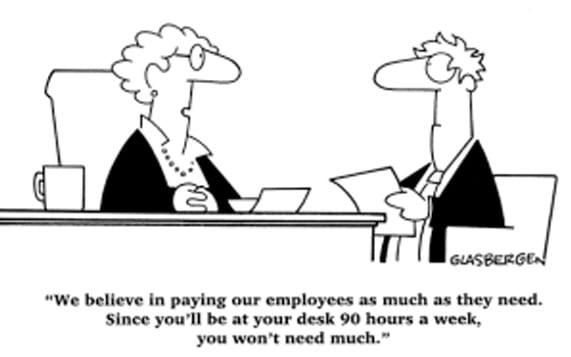
5) You're under compensating them
Are you paying anyone well below market rate? Have some of your team grown in their roles and are now significantly outperforming their compensation?
Have you moved a team member to a more expensive city without properly increasing their salary for the cost of living?
Any of these, as well as disparities in equity, can lead to a lot of resentment. It can also tempt people to see what they're worth elsewhere.
And by the time they have an offer, it's too late.
What to do instead:
Plan ahead for managing people's compensation, especially for people taking on more responsibility.
Your budget may be tight, but if you make incremental improvements you won't wake up a few years down the line searching for a massive amount of money to adjust someone's salary who has one foot out the door.
Further reading:
- Budget crunched? One way to save is to hire outside expensive cities: Why You Should Start Building Distributed Teams (see #2 for ideas on right compensation while saving money)

6) Failing to praise, recognize, or reward good work
Do you reinforce the good work done by your team? Do you tell them specifically why the work was great? Do you look for little opportunities to hand out praise and let your team know you appreciate their hard work?
If you don't recognize good work, your team will not be as motivated to repeat those efforts again. Mary Kay Ash, founder of the Mary Kay cosmetics empire, put it best when she said:

If you don't praise, this can especially hurt your best team members. If you're wondering why good employees leave, consider if it's because they're underappreciated by you.
What to do instead:
Take time to recognize your people for great work. After all, praise is free. If it's really awesome, recognize it in front of their peers (assuming they're comfortable with it) to motivate them even more.
Also, give them specific reinforcement over email and in 1 on 1s. As long as you're specific about why you're giving them praise for, it will be well received; they'll know it's genuine, and most important for you, they'll know exactly what to do to receive more praise.
Further reading:
- We have The Ultimate Workplace Praise Guide: How to be More Positive at Work and Give More Praise to Your Team
- Need some fresh ideas? Here are 5 Ways to Give Effective Praise to Motivate Your Team
- Learn how to apply the The One Simple Secret to Motivating Your Team

7) Keeping bad employees
Nothing frustrates good employees like working with bad ones.
Bad team members make it harder for everyone else to get their work done, slow down progress in general, and lower the bar for the quality of work a team outputs.
Bad team members can quickly turn a strong work environment into a toxic one either by their own poor work, or due to how the team reacts negatively to them. After all, if they're being allowed to stay on the team with their behavior and poor performance, why should anyone else try so hard to do a good job?
What to do instead:
There are two ways you can go about it: outright fire them or try to turn the bad employee around first.
If you do fire them, your team will likely breathe a sigh of relief and you'll find your team is more productive without them.
However, I mentioned earlier that it costs about 6-9 months of an employee's salary to replace them. That's roughly $65,000.
In most cases, it's more cost-effective to try and turn that employee around than fire them right away.
Often bad employees are still good people, but something is off. 70% of employees are either "not engaged” or disengaged according to a Gallup employee engagement report, so they might just need a push in the right direction:
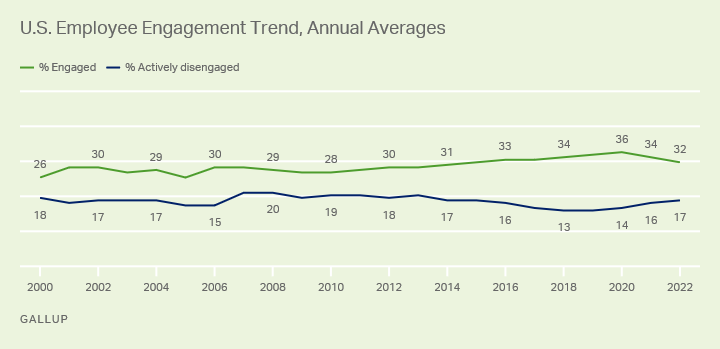
Follow this process to try to turn things around and improve them:
- Make a list of what's not working: What are the real issues?
- Focus on the patterns: What's recurring? These are the major issues to address to get to the root causes.
- Plan to discuss it in a 1 on 1 with them: Don't bring it up right away. Instead, let them talk about what they want first. Ease into it by...
- Ask good probing questions: During the 1 on 1, ask them how they're doing and how they feel about their work. Try and get them to open up to see if there's a cause you may be unaware of.
- Transition to feedback: Ideally, you'll transition here into the issue topic smoothly without making it seem obvious. Offer your feedback.
- Plan clear next steps: Now that it's out in the open, establish next steps with them to handle the issue.
- Keep going: Do this for any other issues until they've either improved or clearly aren't going to change.
After putting in this kind of effort, you've done everything you can to try to help them get better. You then also have a record of your efforts over a few months that you can then take to HR if you have to.
As you do this, keep in mind you're not just saving 1 employee; you're potentially relieving your entire team who is frustrated by them. The last thing you want to do is to keep the bad employee *and* lose a great employee instead.
Further Reading:
- Learn our battle-tested, step-by-step process on how to motivate an underperforming employee.
- See why it doesn't pay off to keep toxic employees on your team: Ask Lighthouse: Toxic Employees

8) Keeping high performing assholes.
In a report from Harvard Business School, Michael Housman and Dylan Minor broke down the real cost of assholes or toxic employees:
"In comparing the two costs, even if a firm could replace an average worker with one who performs in the top 1%; it would still be better off by replacing a toxic worker with an average worker by more than two-to-one."
Toxic employees don't just underperform compared to a great employee in the long run, they bring the entire team down with them.
A good employee sees this and feels it first-hand. After a while, they can't take it anymore, and seeing that you apparently don't mind having an asshole around, they may decide to leave.
What to do instead:
Get rid of those toxic team members– don't try to make these ones work.
Even if the employee is high-performing, they have to go, because of the negative impact they have on the rest of the team. Unfortunately, even if their numbers seem great, they're still a net negative in terms of the they have on the rest of your team. They have to either reform their ways, or leave.
When they leave, the performance of everyone on the team will improve by their absence, so there's really only one thing to do: let them go and reap the benefits.
Don't let an asshole by why good employees quit your team.
Further Reading:
- Your team can become disengaged quickly when they feel like things important to them are beyond their control, so it's important you learn about learned helplessness and its impact on employees. Otherwise, that's a huge reason why good employees quit.

9) Not aligning their work with their goals
Do you know what the goals of your team members are? Does at least some of their work put them in line to accomplish those goals? Are they growing?
If an employee isn't achieving their goals, they'll feel stifled and likely grow bored with their job.
In fact, Millennials say that growth opportunities are their #1 most valued benefit according to Mary Meeker's Internet Trends report:
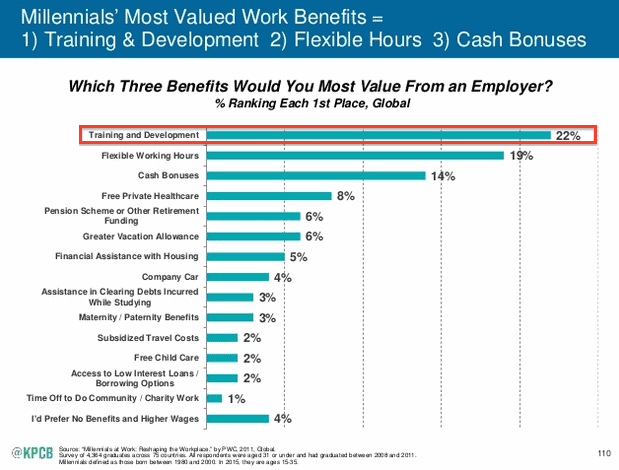
When a person's job doesn't help them achieve their goals, they'll be motivated to look to another job to provide that step up. You then miss out on the knowledge they've built up at your company, and a hungry, employee eager who will want to continue to learn, grow, and add value to your team.
What to do instead:
Have conversations about your employee's goals in your 1 on 1s and work on implementing a plan for their professional growth.
Work to align parts of their job with these goals and make them feel like there's a plan to help them get there over time. If they feel that sense of progress, even if it's slow, they'll be far more motivated, engaged, and likely to stick around.
Further Reading:
Stop asking yourself, "Why do good employees leave my company?" and focus on their growth with the help of these posts:
- Learn How to Help Your Team Achieve Their Goals
- Even if they're not sure, you can still help them: How to help when your team member can't answer "What are your career goals?”
- Be prepared for these conversations with: The 3 Questions Every Manager Struggles with Making Career Development Plans
- And learn from the best: Employee Development Plans: The Competitive Edge to Winning the World Series and Helping Your Team Thrive

10) You embarrass them in front of their peers
This may seem like an obvious toxic behavior you would never do nor allow in your company, but it might have happened without you realizing it.
Ever casually call someone out across the office or make a big deal in front of the team over a mistake someone made? If the answer is yes, you've done it before.
I had a boss who wanted to prove that everyone (except me) cheated in school and proceeded to try to ask everyone around the office if they cheated. I think it was meant to be funny, but I remember how uncomfortable I felt then.
Whatever it is, it can seem innocent, but even things you think are light-hearted can hurt people no matter what face they put on publicly. This is especially true when you're working with people with different cultures and backgrounds than you; what a brash New Yorker thinks is fine, may be pretty offensive to someone with a West coast, relaxed vibe.
Critically, people remember that kind of discomfort for a long time. And, in some cases, it could be something far more embarrassing and borderline abusive than an honest joke that comes off as uncomfortable.
Regardless, this might not typically be a reason in itself why good employees leave your team (just as many of the points on this list aren't), but if there are other issues, it could easily be the proverbial "straw that breaks the camel's back."
What to do instead:
Make sure you don't ever do this sort of thing. Pretty straightforward.
However, as a manager, it's also important that you shut down anyone you see doing it as well. The quality of your culture starts with you, so you need to make sure that if this behavior is seen it's immediately stopped.
If you're treating your team like adults, then embarrassing peers is a childish behavior you should not tolerate. If it does happen, apologize, explain that it wasn't your intention to embarrass them, and make sure it doesn't happen again.

11) A lack of regular progress
The feeling of progress is crucial to people's satisfaction. They need to feel like they're progressing on their work and that their work matters to the company's bigger picture.
Researchers Teresa Amabile (University of Virginia) and Steven Kramer (Stanford), sought to find out what was the number one factor that made people happy at work long-term.
They found that the feeling of making progress each day was the single biggest contributor to happiness at work, something they dubbed the "Progress Principle”.
When people aren't making progress, they start to burn out. Nothing is more devastating to a great employee than burn out. It saps them of their abilities to be a productive, skilled team member and slowly makes them feel like showing up to work is pointless.
This is when learned helplessness takes over, at which point the employee loses all belief that they have any ability to proactively change their circumstances. At that point, their departure is a matter of when, not if.
What to do instead:
Make sure team members have projects that are broken into small enough chunks that they can regularly make progress on them.
Check in with them on their goals to make sure they feel that same sense of progress. It's not enough that they seem productive to you, they need to feel that sense of progress themselves, otherwise it's pointless.
This is where your praise and recognition, again, can be powerful. The more you bring attention to the progress they're making, the more you'll help create those feelings in their mind and the better they'll feel about it.
This is especially important on big projects; a few celebrated milestones along the way can keep them heading in the right direction even if a project is dragging a bit.

12) Being a hypocrite, aka - "Do as I say not as I do”
Whether you're the leader of a small team or the founder or CEO of an established company, the power to create your organization's culture– a culture that defines your team's performance and happiness– is in your hands.
Unfortunately, that goes both ways. You could lead your team based on positive, inspiring, and well-aligned actions. Unfortunately, instead some leaders say one thing with their words, but do something else entirely with their actions.
For example:
- You say, "Don't be late!” (Though you constantly come in late)
- You preach, "Take responsibility!” (While you blame your team for your shortcomings regularly)
- Or: You encourage, "Take care of yourself! Plan breaks or personal time.” (Yet you push yourself until you're ragged and on the verge of burnout each day, while messaging people at 3am)
If you fail to take responsibility for your own actions and consistently contradict yourself with your words, your team won't respect you. Your words gradually will become cheaper in their eyes when you do this. And not long after that, they will stop listening to you entirely.
What to do instead:
It's hard to look in the mirror and admit that you're the change that needs to happen.
However, as a leader, it's your example that sets the tone and serves as the foundation of your organization's culture.
Follow these steps to start the process of looking at yourself to create the necessary change:
- Give yourself time to pause and reflect; this is your best way to catch your own mistakes and identify places you could improve
- Take responsibility and admit that change needs to be made by you, publicly to your team if you have to
- Look for your blind spots to find the areas you most need to work on (work on developing self-awareness)
- Set and maintain that new standard through your actions, both setting the floor by what you reject, and give constructive feedback on and the ceiling by what you praise and how you reinforce it.
As Pixar co-founder and former President, Ed Catmull, said on setting the standard and following through on your words, you have to live it:

Don't just say it, follow through on your words with action to prove to your team that not only your words have value, but you're worthy of being followed.
A leader who is consistent in their words and actions, and makes a good faith effort to take care of their team doesn't have to worry about why great employees quit.

13) Not getting their buy-in and support as things change
When you're considering or planning to make a change, the last thing you want to do is assume you don't need to get buy-in from your team just because you're the boss now.
If you make sweeping, unexpected changes without first telling your team and getting them to buy into those changes, you'll make them feel like they have no control over what happens.
That lack of control is not only uncomfortable, but unsettling. They could very well have insight or feedback that would make the idea better, or be aware of a pitfall that you could have avoided if you just asked them.
Especially for longer tenured employees, they expect to know about big changes before they happen. An unwanted and unexpected surprise they're not a fan of is a great way to have them decide "things have changed" and start looking elsewhere for a job.
A dramatic enough change that blindsides an employee can be the catalyst for why good employees quit, so don't let big changes happen without talking about it.

What to do instead:
Instead of making surprise changes, get their buy-in and support beforehand.
Sit your team down and talk to them about why you're considering making the change and what it will mean for them and the rest of the team. You can do this in your 1 on 1s if it needs to be quiet, or a team meeting is fine for smaller changes as long as you still listen to feedback they all have.
New changes can be scary, so show them that you're ready to lead the way to implement those changes instead of making someone else responsible.
Persuade them with the Elephant & the Rider
Make sure you don't weigh too heavily on the analytical, rational part of your brain to try and convince them. Instead, use the elephant, i.e. emotions, to coax them towards change.
The analogy of the rider and the elephant is useful here as you'll need to know how to elicit a response from the emotional part of the brain to get your team behind you.
Researcher and University of Virginia professor, Jonathan Haidt, coined the idea of the rider and the elephant in his book, The Happiness Hypothesis:
"The image I came up with for myself, as I marveled at my weakness [of willpower], was that I was a rider on the back of an elephant.
I'm holding the reins in my hands, and by pulling one way or the other I can tell the elephant to turn, to stop, or to go. I can direct things, but only when the elephant doesn't have desires of his own. When the elephant really wants to do something, I'm no match for him.”
It's important to remember the elephant when you're working to get buy-in from your team for a change you're trying to make.

Explaining logically why it makes sense isn't likely to be very productive. However, painting a picture for your team of the benefits of the change and how it will impact their work in a positive way will compel the emotional elephant forward and make them much more likely to buy-in.
Then, if you listen to and try to address their concerns, you'll be more likely to rally their support. If you can be flexible in some ways and account for their feedback, it will be even better.
Further Reading:
- Learn more about motivating your team with the elephant and the rider here.
- Learn How to get buy in for an important change
- We have a Step by Step guide for getting buy in at work here.
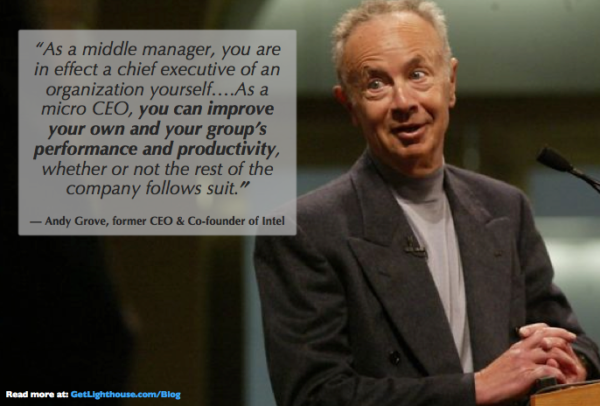
14) Overloading them or burning them out
In the second half of 2021, Gallup reported that almost half of U.S. employees were actively job searching. This phenomenon was called “The Great Resignation”.
One of the biggest reasons for people quitting their jobs was feeling overwhelmed by work.
In Q4 of last year, ComPsych, found that “57 percent of employers think burnout is still affecting turnover and retention at their company“.
Without a clear way to separate free time and work while working from home, your best performers are at risk of sinking into feelings of burnout until they decide they’ve had enough.
It doesn’t help when there’s so much uncertainty and stress happening for many outside of work, too. If you don’t take time to address these issues and assume they can handle a high workload all the time, you’re in for an unwanted surprise.
What to do instead
There's a few things you can do to help your team member either avoid becoming overloaded, or fix things once they already are overworked.
First, regularly check on their workload; is it too much, not enough, or just right? Make sure they get the support they need, and have a balanced flow (i.e.- It's okay to push hard sometimes.)
You can also analyze their daily tasks - are they working mostly on $10/hr tasks or $100/hr tasks? Help them get simpler tasks off their plate and let them do more of what they’re great at.
Consider if they are being bogged down by too many admin tasks, filing things, performing tedious tasks an app could do out of the box, or avoiding delegating work when they should be? It’s your job to help them change that.
Challenge them to consider which parts of their work are $100/hr tasks, and which are lower value and should be delegated or eliminated. Then, help them focus on what matters the most and give them the tools and resources they need to free up their time.
This allows you to both get more value out of their performance and ensures you’re protecting them from burnout. The latter is particularly important, because burnout is a definite reason why good employees will leave.
Further reading:
- Learn Why Priority Management Trumps Time Management, or how you and your team can accomplish more in less time.
- Discover the Key Gallup Workplace Statistics to Help You Lead in 2022 and why burnout is still a huge issue across the globe.
There are a lot of reasons why good employees leave… that you have influence over. Apply these lessons and to avoid dealing with "my best employee quit" situations.
These are all hard lessons to learn. Many leaders have learned them the hard way. You may even have experienced some of them yourself.
The good news is, usually people leave for more than one reason. That means an occasional slip up will be forgiven. However, if you break several of these, it will catch up with you.
If you're actively looking to improve and fix issues, chances are you'll notice multiple of these issues. The best thing to do is to work on them one at a time.
Start by taking responsibility as your team's leader for the impact these issues are having and dedicate yourself to making the necessary changes. Use our links of further reading then to get tactical on addressing each issue.
We've given you 14 reasons why today. What are the behaviors you've seen cause good people to leave?
Let us know what you've found are the main reasons good employees quit, and don't forget to check out the additional resources below...
Further reading:
- Sudden resignations can catch you off guard, leaving you overwhelmed. You need to learn what to say when someone resigns suddenly.
- Learn more reasons Why People Leave Managers, not Companies (and what to do about it)
- If your teammate will be leaving you, then you need to know how to announce employee departures.
- Be vigilant of the single greatest source of your organizational problems (and their solutions).
- You best tool for fixing problems and bringing out the best in your team is the 1 on 1. Learn to make the most of them with a great one-on-one meeting template.
- You should also know how toxic positivity at the workplace can ruin your culture.
The Creating High Performing Teams podcast teaches you how to help your struggling star who could be at risk of leaving, too:

How do I keep my employees from leaving?

Many of the reasons that employees leave have nothing to do with the company, but everything to do with the manager.
Here are some tips for how to keep a good employee from leaving and to retain your best people long-term:
- Follow through with what you say you're going to do
- Have regular 1 on 1s
- Listen to their ideas
- Trust them and keep them informed of company changes
- Compensate them appropriately
- Praise, recognize, and reward good work
- Turn around, or get rid of, bad employees
- Fire toxic employees
- Align their work with their goals
- Respect them in front of their peers
- Help them maintain a sense of progress and growth
- Lead by example
- Get their buy-in and support for big changes
Learn more about them and what to do about each of those reasons here.
Why do high performers quit?

There are a lot of reasons why high performers quit and here are some of them:
- Managers don’t follow through on their ideas
- They don’t have regular 1 on 1s
- Their ideas are ignored
- They aren’t being treated like adults
- Companies are under compensating them
- Managers are failing to praise, recognize, or reward their good work
- Companies keeping bad employees instead of firing them
- Companies keeping high performing assholes
- Their work is not aligned with their goals
- They are being embarrassed in front of their peers
- A lack of regular progress
- Managers being hypocrites, aka - "Do as I say not as I do”
- Not getting their buy-in and support as things change
To learn more about this topic, click here.
How do I keep my best employee from leaving?
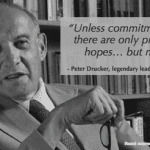
Many of the reasons why employees leave have nothing to do with the company, but everything to do with the manager. Here are some tips for how to keep your best employee from leaving:
- Make sure to follow through
- Have regular 1 on 1s
- Listen to their ideas
- Trust them and keep them informed of company changes
- Fair compensation is a must
- Praise, recognize, and reward good work
- Fire bad employees
- Make sure to also fire toxic employees
- Align their work with their goals
- Show them respect in front of their peers
- Help them maintain a sense of progress and growth
- Lead by example
- Get their buy-in and support for big changes
To learn more about this topic, click here.




